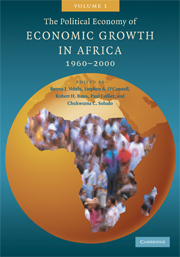Book contents
- Frontmatter
- Contents
- List of figures
- List of tables
- List of contributors
- Foreword
- List of acronyms
- PART 1 OVERVIEW
- 1 Policy plus: African growth performance, 1960–2000
- 2 Opportunities and choices
- 3 Anti-growth syndromes in Africa: a synthesis of the case studies
- PART 2 INTERPRETATION
- PART 3 EXPLANATION
- PART 4 LOOKING AHEAD
- Index
- References
2 - Opportunities and choices
Published online by Cambridge University Press: 09 January 2010
- Frontmatter
- Contents
- List of figures
- List of tables
- List of contributors
- Foreword
- List of acronyms
- PART 1 OVERVIEW
- 1 Policy plus: African growth performance, 1960–2000
- 2 Opportunities and choices
- 3 Anti-growth syndromes in Africa: a synthesis of the case studies
- PART 2 INTERPRETATION
- PART 3 EXPLANATION
- PART 4 LOOKING AHEAD
- Index
- References
Summary
Introduction
Growth depends upon the interaction of opportunities and choices. A country, or an entire region, may fail to grow either because there are no opportunities, or because choices are made that preclude opportunities being taken. The stark phenomenon we are trying to understand is that for forty years Africa stagnated while other developing regions grew. This chapter attempts to explain this alarming phenomenon in terms of the distinctive opportunities open to the region and the distinctive choices which were made.
Before explanation comes description. The comparison of regional growth rates must surely seem a straightforward matter. In fact, especially for Africa, it is sensitive to apparently arcane choices. To date, in our view scholars have invariably got these choices wrong and so we must begin with a brief discussion of these issues.
The basic unit for reporting GDP and its growth is the nation: regional figures on GDP are built up from these observations at the level of the nation. The most widely cited regional growth rates come from the World Economic Outlook (WEO) of the IMF and the Global Economic Prospects (GEP) of the World Bank. In both cases, the regional figures are half-way houses on the road to estimates of the growth of global GDP. Necessarily, in such an approach, the growth rates of regional and global GDP are simply arrived at from the total level of GDP and its comparison with the previous year.
- Type
- Chapter
- Information
- Publisher: Cambridge University PressPrint publication year: 2007
References
- 12
- Cited by



